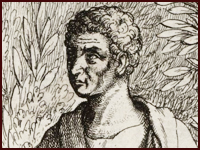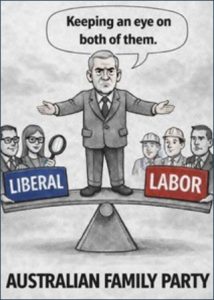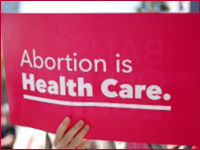‘Who guards the guardians?’
 First coined by the Roman poet Decimus Junius Juvenalis, ‘Who guards the guardians?’ is a question that has been invoked throughout the past two thousand years – most notably in the Magna Carta of 1215 and the US Declaration of Independence of 1776.
First coined by the Roman poet Decimus Junius Juvenalis, ‘Who guards the guardians?’ is a question that has been invoked throughout the past two thousand years – most notably in the Magna Carta of 1215 and the US Declaration of Independence of 1776.
In our current situation – and I am indebted to The Australian’s Henry Ergas for his brilliant insights – the application of this question is strikingly apt.
The eighteenth-century English philosopher Edmund Burke once warned the UK House of Commons that free societies “Are not primarily ruled by laws … but by ‘a bond of trust’ that persuades citizens to vest governments with the powers needed to secure peace and prosperity”.
Ergas says that Anthony Albanese’s refusal to establish a Royal Commission into the management of the Covid pandemic was an early indication that the longstanding compact between the governors and the governed was not for him.
Indeed.
Why, for example, was Australia’s response to Covid such a radical departure from the prevailing consensus outlined in the World Health Organisation’s September 2019 report?
And why was our own existing pandemic preparedness plan not followed?
Why did Australia’s regulators accept results from the vaccine manufacturers’ own trial results which were conducted overseas, instead of requiring them to be done locally to our standards and satisfaction?
And why, once it was established in February 2020 that the risk from Covid was concentrated in the elderly, were healthy people put under house arrest, treating them as germ-carrying criminals?
As ANU Professor Ramesh Thakur notes, ‘People were locked up at home on dubious data and science, forced to isolate from parents and grandchildren, unable to visit grandparents in their final days or attend family reunions, weddings, funerals and birthdays, coerced into taking the shot in order to shop, travel and keep jobs on false assurances of safety and effectiveness.
Australia’s leaders – politicians, health bureaucrats and law enforcement chiefs – behaved more like tyrants and psychopaths than public servants.
The Covid questions remain unanswered.
Albanese’s initial refusal to call a Royal Commission into the Bondi massacre only confirms his contempt for the governor–governed compact.
To be clear, Albanese did not, as he now claims, ‘take time’ to consider setting up a Royal Commission – he argued strenuously against establishing one at all – until his position became untenable.
Second, now that a Royal Commission has been announced, the weasel words – ‘social cohesion’, ‘all forms of racism’, ‘inciting hatred’, ‘Islamophobia’, ‘hate preachers’ – and cleverly constructed dictums such as ‘hatred in their minds, but guns in their hands’, are introduced in order to distract us from the real problem.
One Labor MP has even suggested criminalising not just Islamophobia, but other hatreds, including homophobia.
One thing is certain: the new speech rules of the ‘Combatting Antisemitism, Hate and Extremism Bill’ will not only fail to stop the real cause of the Bondi massacre – radical Islam – but will be used to gag anyone who criticises it.
Keeping Out Minor Parties
In March 2016, the Liberal Party joined forces with the Greens to abolish Senate Group Voting Tickets. Group Voting Tickets allowed voters to simply put a ‘1’ above-the-line and delegate to their party of choice the distribution of preferences. Although minor parties differed widely on policy matters, the one thing they had in common was their dislike of the Greens. Using Group Voting Tickets, minor parties came to arrangements with each other to combine their votes to get ahead of them.
The Liberals–Greens deal ended that.
Former Liberal Prime Minister John Howard warned the government that the Liberal Party’s deal with the Greens could backfire on them. “The principal beneficiary of these changes will be the Australian Greens,” Howard said.
He was right. The Greens have won six Senate seats at each election since and now have the balance of power – enough to join forces with Labor to pass or block legislation.
The particularly galling aspect of this was the fact the Liberal Party went to the 2013 election promising to abolish the carbon tax, abolish the mining tax and stop the boats. Upon election, the Senate crossbench – I was one of them – voted in support of these three key election pledges. The Greens opposed them. Yet during that term, the Liberals did a deal with those very same Greens to get rid of the crossbenchers who had supported them!
Whoever said ‘No good turn goes unpunished’ certainly got that right.
Balance of Power
 In South Australia, the Labor Government is spending somewhere in the vicinity of $50m on political advertising dressed up as ‘community information’.
In South Australia, the Labor Government is spending somewhere in the vicinity of $50m on political advertising dressed up as ‘community information’.
Its 2022 election promise to ‘fix ambulance ramping’ has spectacularly failed – in fact, ambulance ramping is now twice as bad as it was in 2022.
And to buy off the Ambos – who were the most ardent campaigners for Labor at the last election – the government has just given them a massive pay rise.
The toxic algal bloom which has blighted the South Australian coastline for almost a year, has not been brought under control. And allegations that public servants have been told not to discuss the cause of the algal disaster until after the State election do not look good.
Labor’s green hydrogen debacle is projected to cost state taxpayers nearly $500 million while State debt is climbing towards $50bn, and South Australia, once considered the nation’s home-ownership capital, is now ranked the 2nd least affordable in Australia!
Labor has also introduced legislation into the South Australian parliament enshrining an Aboriginal Voice, despite the state voting overwhelmingly ‘No’ in the Voice referendum. Every electorate in South Australia voted ‘No’.
How’s does all that measure up against the governor–governed pact?
Who guards the guardians?
But what about the Liberals? Are they any better?
It was the actions of former Liberal Premier Steven Marshall and his Deputy Vickie Chapman, which took the Liberal Party into far-left areas normally the province of the Greens, that led to the establishment of the Australian Family Party in 2020.
Under the Liberals, the rights of faith-based organisations were threatened.
Led by Deputy-Premier Vickie Chapman, the SA Liberal Party proposed removing certain exemptions – the ‘Equal Opportunity (Religious Bodies) Amendment Bill 2020’ – which had allowed faith-based organisations to run their schools, hospitals and other services in accordance with their beliefs.
Liberal Treasurer Rob Lucas also attempted to deny a Christian college its payroll tax exemption. The college was forced to take the government to the SA Supreme Court to defend the matter.
And since the Marshall–Chapman government facilitated the passage of the Voluntary Assisted Dying Act, more than 500 South Australians have chosen to end their lives.
Conclusion
Pollsters and focus groups have reported that people don’t really trust the Liberals, but at the same time they can’t stand Labor and its hypocrisy – pushing its so-called ‘renewable’ energy schemes to save the planet one minute, and bulldozing thousands of trees to build golf courses and erect transmission lines the next.
Someone definitely needs to keep an eye on both of them …
Thank you for your support.
 When the great French novelist Victor Hugo was in his 80s, he reflected on his life with the words, “I am like a forest that has been continuously cut down; yet each time I am cut down, the new growth has more life than ever”.
When the great French novelist Victor Hugo was in his 80s, he reflected on his life with the words, “I am like a forest that has been continuously cut down; yet each time I am cut down, the new growth has more life than ever”. Heinrich Heine’s ominous line, “Those who burn books will in the end burn people,” is one of the most quoted in modern history. It appears in his 1821 play, Almansor.
Heinrich Heine’s ominous line, “Those who burn books will in the end burn people,” is one of the most quoted in modern history. It appears in his 1821 play, Almansor.